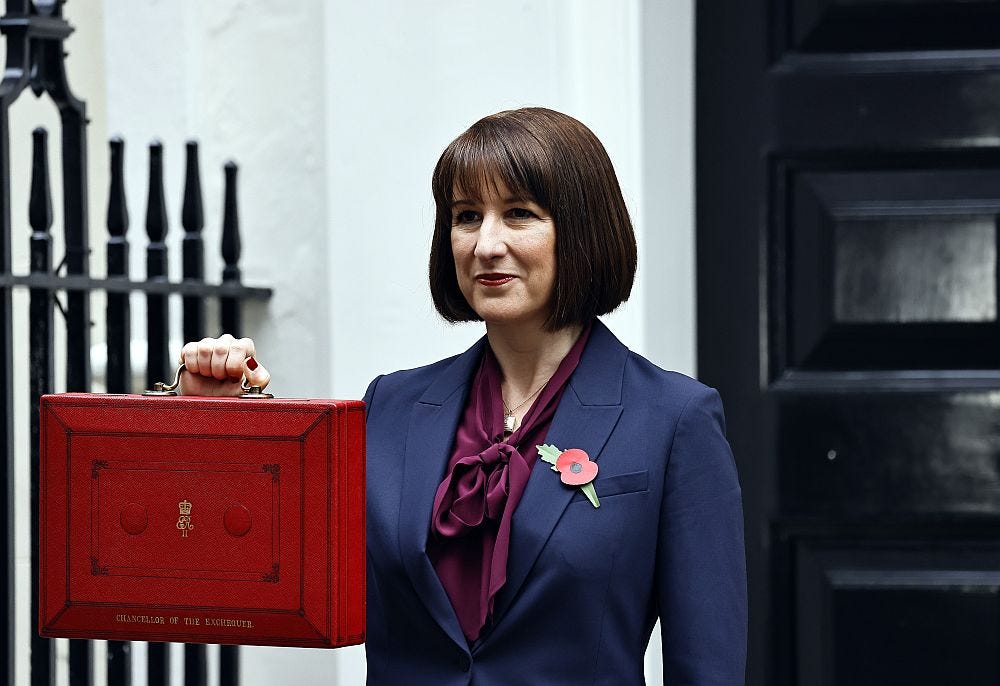The Omnishambles Budget, mark 2?
Whatever Rachel Reeves announces on Wednesday, it has become abundantly clear that the Labour government has failed to ‘fix the foundations’.
First appearing as an insult in the third series of BBC political satire The Thick of It in 2009, ‘omnishambles’ became 2012’s ‘Word of the Year’ after being widely used to describe George Osborne’s Budget that year. Most notably, Osborne was ridiculed for the so-called ‘pasty tax’, a modest change to VAT rules around takeaway food that cost a lot more in political capital than it could ever raise in tax revenue.
But the omnishambles around Reeves’s autumn statement is on a different level to the problems that Osborne had. For starters, her first autumn statement, in 2024, made significant increases to taxation, particularly by raising employers’ national insurance rates and lowering the threshold at which it needed to be paid. The result was to make employing people, particularly part-time staff, more expensive.
By raising something like £25 billion, this and other tax rises were supposed to be a one-off. At the time, blaming the failings of the previous government, Reeves said: ‘As a result of what we’ve done, we’re not going to have to come back and ever do a budget like this again, because we’ve brought everything out into the open.’ But her ‘fiscal headroom’ has quickly disappeared. To have a prayer of convincing the bond markets that she is serious about tackling the government’s deficit, she will need to take more action.
There are three ways out for Reeves. First, the economy could start growing strongly, increasing tax receipts. There is no sign of this happening – the economy is moribund and the government is incapable of doing any of things necessary to turn it round, from scrapping Net Zero policies to slashing regulations. Second, she could substantially cut public spending. But given that Labour MPs refused to sanction even a moderate cut in welfare spending, this isn’t going to happen, either.
That leaves her with no alternative but to raise more tax. The most effective way to do this would be to raise income tax, national insurance or value added tax (VAT). However, Labour promised not to raise these taxes in its election manifesto. Perhaps the highlight of this year’s omnishambles was Reeves’s early-morning ‘scene setting’ speech earlier this month (essentially, a press conference) to prepare the ground for a manifesto-breaching hike in income-tax rates. Except the backlash was so severe that the idea was quickly disowned.
So, on Wednesday, Reeves will likely announce a range of piecemeal tax rises that may or may not end up raising enough money to save the government’s face. What exactly is planned is anyone’s guess because so many ideas have been floated from various ‘sources’ that it’s difficult to tell what is serious.
What is abundantly clear is that Labour is at a complete impasse. There is simply no viable plan for growing the economy. Will Dunn, writing in the New Statesman, summarises research from one hedge fund into Labour’s huge intake of new MPs following the 2024 General Election: ‘“There is no plan, there is no vision, and they’re not going to succeed because they don’t have the talent.” The fund decided to take a short position on UK gilts, effectively betting that Britain’s borrowing costs would rise. They made a lot of money on that bet.’
Phil Mullan, writing for spiked, describes the situation bluntly: ‘The chaos and incompetence of this government are almost beyond compare. One week it’s insisting that income-tax rises are necessary, the next it’s saying they’re not. It seems to have absolutely no idea how to tackle Britain’s profound economic challenges.’ Mullan argues that a top priority is to stop spending so much, focusing on the core business of the state and freezing public spending (in real terms) on as many other areas as possible.
The longer-term solution, Mullan argues, is to get the economy growing again. How we do that was the topic of a debate, ‘Decline… and fall? The UK economy’ at the Battle of Ideas festival in October. I was one of the speakers – along with Vicky Pryce, Jon Moynihan and Karl Williams – and we tackled why the economy is in such a mess and how to fix it. Watch the opening speeches below. You can find much more from the Battle of Ideas festival on our YouTube channel.
Read on
Rachel Reeves has no answer to Britain’s financial mess
Phil Mullan, spiked, 16 November 2025
Meet the bond-market vigilantes
Will Dunn, New Statesman, 19 November 2025
Reeves’s endless tax scaremongering is killing off animal spirits
Liam Halligan, Telegraph, 23 November 2025
Britain’s Net Zero nightmare is destroying heavy industry
Rob Lyons, spiked, 23 November 2025


